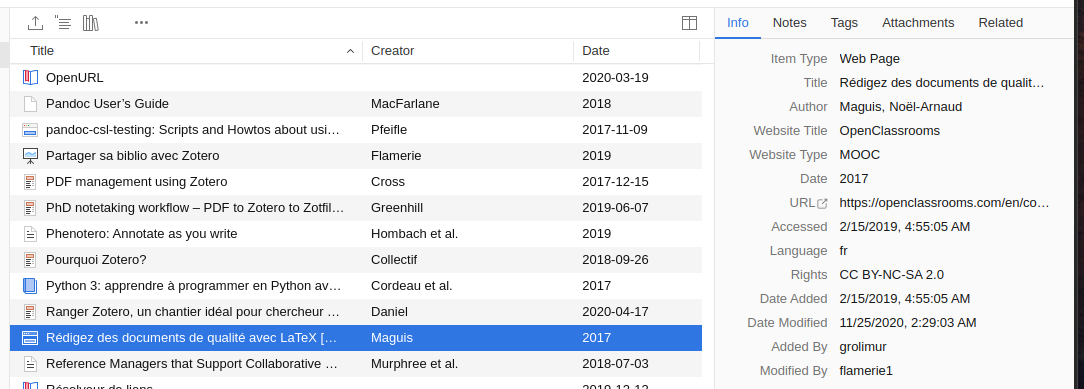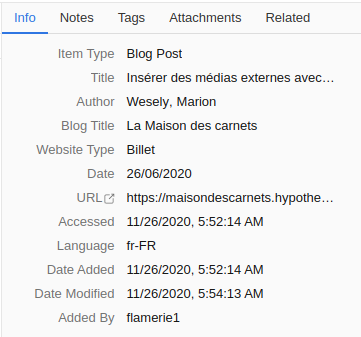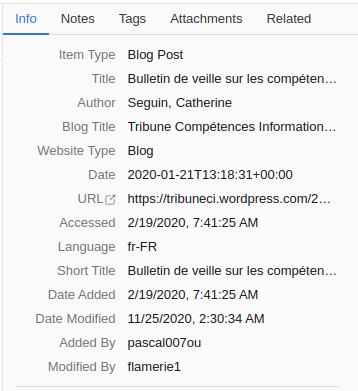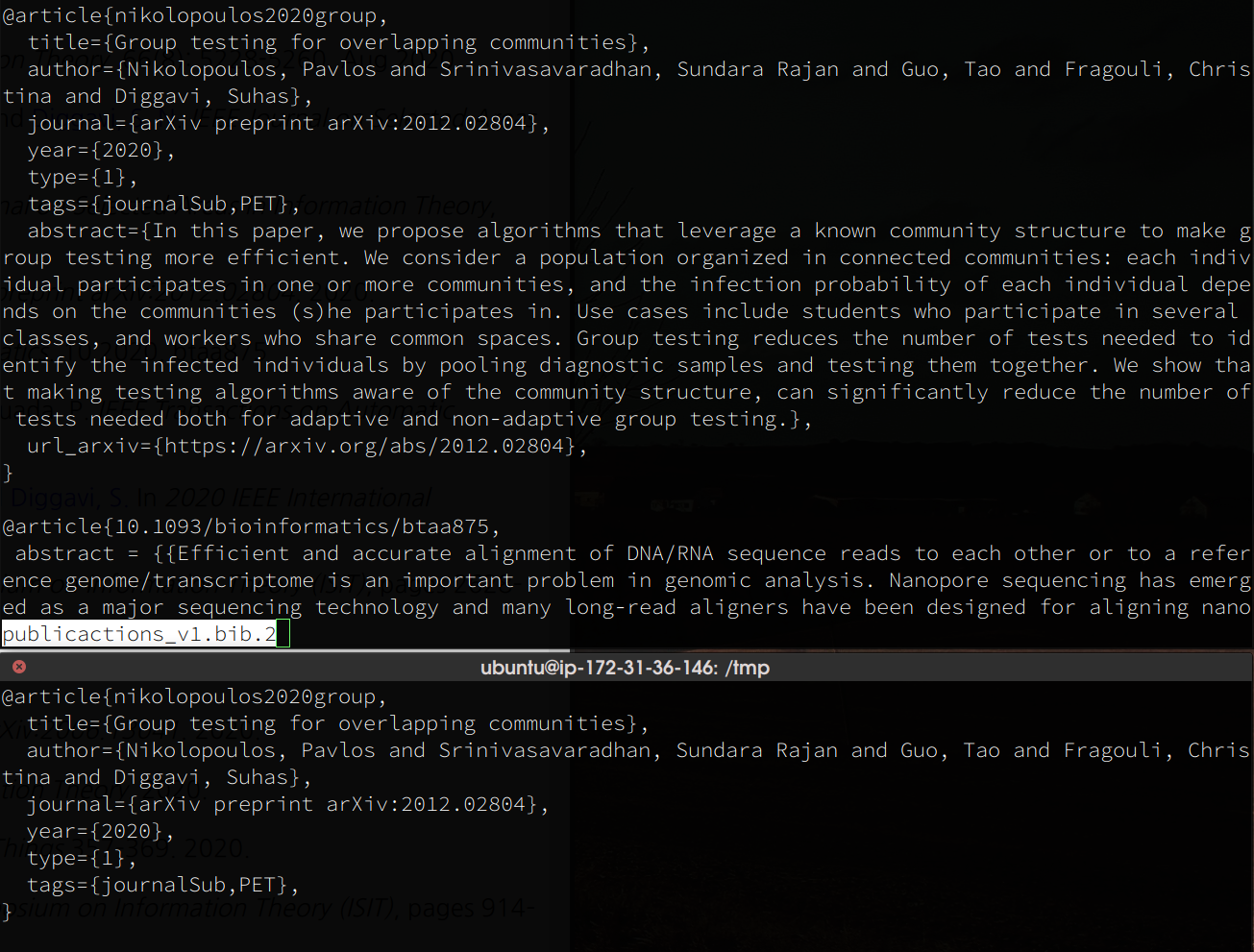Your comments
Hm, this is more of a question on how your papers are organized in your Zotero library than about BibBase. BibBase just receives whatever Zotero exports your data as. Since you group is public though I had a look and found that there "website" entries seem to have different website types set, and that's what the Zotero API seems to use for the "type" field you see in the exported bibtex entries.



You should be able to just change those website types to whatever you want the document type to be in BibBase.
It should work if you re-execute the Zotero flow from the bibbase.org homepage. Have you already tried that?
What I've shown you above is verbatim what the bibbase server receives when requesting your bibtex file. I know it is confusing that you and I when we request that seemingly same URL get a different response, but that's how CDNs work: they actually consist of very many servers distributed around the globe such that users can always get the pages they request as fast as possible, namely by being served by the closest such server. The bibbase server is located in Oregon and may hence be receiving the file from a different server in the CDN of your hosting provider.
Here is a screenshot of me making the exact same request from my machine (in California) and from the bibbase server in Oregon. As you can see the results are different.

So unfortunately there is nothing I can do here until your hosting provider refreshes their CDN cache serving that region in Oregon. I've already tried tricking your provider into refreshing the file by adding extra URL parameters (?something=1). This sometimes works because it's a different URL. But in this case it didn't.
In case it helps, this is the response the bibbase server is currently receiving back from your host:
2020-12-17T17:44:37.909Z [get] parsing bibtex response {
statusCode: 200,
content: '@article{nikolopoulos2020group,\n' +
' title={Group testing for overlapping communities},\n' +
' author={Nikolopoulos, Pavlos and Srinivasavaradhan, Sundara Rajan and Guo, Tao and Fragouli, Christina and Diggavi, Suhas},\n' +
' journal={arXiv preprint arXiv:2012.02804},\n' +
' year={2020},\n' +
' type={1},\n' +
' tags={journalSub,PET},\n' +
'}\n' +
...
with these response headers:
headers: {
server: 'nginx',
date: 'Thu, 17 Dec 2020 17:44:37 GMT',
'content-type': 'application/octet-stream',
'content-length': '277003',
connection: 'keep-alive',
'x-amz-id-2': 'rqGQLN0EbX6/JSJzs/ZjBOgBq8HuCMiGDYvlamKaGWUpCeTy28smhHA0GbYqcJxRt3IF4Dx0Xn4=',
'x-amz-request-id': '562041A0612D8C76',
'last-modified': 'Sat, 12 Dec 2020 21:23:39 GMT',
etag: 'W/"50858318b7745df8c1eaad3520bac5ea"',
'x-amz-version-id': 'jg0nqRDISTsgIq6hVezjG9BydNPTdUtU',
expires: 'Sun, 12 Dec 2021 17:44:14 GMT',
'cache-control': 'max-age=31104000',
'access-control-allow-origin': '*',
vary: 'Accept-Encoding',
'x-cache': 'HIT',
'accept-ranges': 'bytes'
},
You may want to try a different hosting provider for your bibtex file, or you can let BibBase host your bibtex file directly in case one of our premium plans makes sense for your group(s).
This looks like an issue with your hosting provider, which is where the bibtex file is hosted. They seem to use a CDN (content delivery network, essentially a globally distributed cache) and the BibBase server seems to be getting the same result each time it requests your bib file. Yahya Ezzeldin from https://research.seas.ucla.edu/arni/ actually reported the same issue just recently.
> curl -I https://research.seas.ucla.edu/licos/files/2019/08/publicactions_v1.bib
HTTP/2 302
server: openresty
date: Thu, 17 Dec 2020 01:40:32 GMT
content-type: image/bib
location: https://cpb-us-w2.wpmucdn.com/research.seas.ucla.edu/dist/b/22/files/2019/08/publicactions_v1.bib
cache-control: public, max-age=31536000
etag: 1c2adaf15f4bd8d6126f09d2e8e66643
x-cache: BYPASS
x-cache-bypass-reason: Arguments found
If I interpret that max-age for the cache correctly then the problem may solve itself about 9 hours. after your editing. But I'll also look for a way to request bibbase to work around this (there might be ways to force the CDN provider to refetch the latest version).
I think I found it. It https://www.licos.ee.ucla.edu/publications/ right?
Can you help me find the change you made to the bibtex file that you don't see updating on the page? The page has 301 publications, and the bibtex files also contains 301 entries, so it's not obvious what the difference is.
Thanks.
Hi Dhaivat,
Happy to take a look! Can you send me also the URL of the publication page where this bibtex file is used?
Thanks.
It's not yet clear what the path forward looks like with Mendeley. Since private groups seem to continue on, it might be possible to convert your public groups to private groups and still use them as data-source for BibBase. You should also be able to continue to use your library (My Publications) as data source. Details about changes to the API we are using to fetch that data from Mendeley are not yet announced:
I use Mendeley Developer APIs, what do I need to know?
- Mendeley Developer APIs will remain available to our integration partners and apps.
- Some changes to API endpoints should be expected where features are being retired, such as Mendeley Profiles and Public Groups.
- We will communicate changes to our integration partners and app developers as soon as they have been finalised.
In worst case you can always export your data from Mendeley (or even just download the full bibtex file provided by BibBase from your library/group). Once you have that you could import it into Zotero or use the bibtex file directly as data source for BibBase. The latter always gives you the most flexibility and control.
We'll update this thread when we hear more.
Hi Grolimur,
I had a look at the image you sent but can't quite tell what you mean by doctype or what else you might thing is wrong with that screenshot. Or do you mean that appearance of "2019.tex.ids" on the last entry? Could you send me a link to your page so I can dig deeper?
Customer support service by UserEcho


ah, yes, you are right, it's still stored on your bibbase account if you are logged in. If you just want to use your Zotero publications on your homepage then you can first log out from BibBase and then repeat the Zotero flow. It should work then. I'll see that we accommodate this case where a stores zotero key is no longer valid (and then just offer to re-authenticate).
Thanks for reporting.